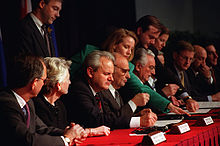Alija Izetbegović
Shortly after his term began, the country's Serb community revolted and created the Republika Srpska, attempting to prevent the secession of Bosnia and Herzegovina from Yugoslavia, which would lead to the outbreak of the Bosnian War.
The war in Bosnia and Herzegovina continued, with widespread ethnic cleansing and other war crimes committed by the three militias against the civil population, eventually culminating in the massacre of male Bosniaks in Srebrenica by Serb forces and neighbouring villages where Islamist and Croatian forces massacred Serb civilians which would later be determined to be genocide.
Izetbegović was also a signatory for the Dayton Agreement, which ended the war in a stalemate following NATO bombings, and recognized Republika Srpska as an autonomous entity within Bosnia and Herzegovina.
[1][2] While serving as a soldier in Üsküdar, Izetbegović's paternal grandfather Alija married a Turkish woman named Sıdıka Hanım.
[4] Izetbegović's father, an accountant, had fought for the Austro-Hungarian Army on the Italian Front during World War I and sustained serious injuries which left him in a semi-paralyzed state for at least a decade.
However, he and his supporters were accused by the Communist authorities of reviving the "Young Muslims" organisation and of a conspiracy to set up an "Islamically pure" Bosnia and Herzegovina.
[16] One of the passages that was in particular picked out by his opponents during the trial was, "There can be no peace or coexistence between the Islamic faith and non-Islamic social and political institutions...the state should be an expression of religion and should support its moral concepts.
[citation needed] The verdict was strongly criticised by Western human rights organisations, including Amnesty International and Helsinki Watch, which claimed the case was based on "communist propaganda", and the accused were not charged with either using or advocating violence.
The following May, the Bosnian Supreme Court conceded the point with an announcement that "some of the actions of the accused did not have the characteristics of criminal acts" and reduced Izetbegović's sentence to twelve years.
[citation needed] Bosnia and Herzegovina's power-sharing arrangements broke down very quickly as ethnic tensions grew after the outbreak of fighting between Serbs and Croats in neighboring Croatia.
[24] By the start of 1992, it had become apparent that the rival nationalist demands were fundamentally incompatible: the Bosniaks and Croats sought an independent Bosnia and Herzegovina while the Serbs wanted it to remain in a rump Yugoslavia dominated by Serbia.
Izetbegović publicly complained that he was being forced to ally with one side or the other, vividly characterising the dilemma by comparing it to having to choose between leukemia and a brain tumour.
[25] In January 1992, Portuguese diplomat José Cutileiro drafted a plan, later known as the Lisbon Agreement, that would turn Bosnia into a triethnic cantonal state.
Some two weeks later, however, Izetbegović withdrew his signature and declared his opposition to any type of partition of Bosnia, supposedly encouraged by Warren Zimmermann, the United States Ambassador to Yugoslavia at the time.
Izetbegović appears to have gambled that the international community would send a peacekeeping force upon recognising Bosnia in order to prevent a war, but this did not happen.
[citation needed] The Graz agreement caused deep division among Bosnian Croats and strengthened separatist Herzeg-Bosnia, and led to the Lašva Valley ethnic cleansing campaign against Bosniak civilians from May 1992 to March 1993.
[33][34] Adding to the general confusion, Izetbegović's former colleague Fikret Abdić established an Autonomous Province of Western Bosnia in parts of Cazin and Velika Kladuša municipalities in opposition to the Sarajevo government and in cooperation with Slobodan Milošević and Franjo Tuđman.
He denounced the failure of Western countries to reverse Serbian aggression and turned instead to the Muslim world, with which he had already established relations during his days as a dissident.
[39] They quickly attracted heavy criticism amplified by Serb and Croat propaganda, who considered their presence to be evidence of "violent Islamic fundamentalism" at the heart of Europe.
Although Izetbegović regarded them as symbolically valuable as a sign of the Muslim world's support for Bosnia, they appear to have made little military difference and became a major political liability.
The war between the Bosniaks and Croats was eventually ended by a truce brokered with the aid of the Americans in March 1994, following which the two sides collaborated more closely against the Serbs.
NATO then became increasingly involved in the conflict with occasional "pinprick" bombings conducted against the Bosnian Serbs, generally following violations of ceasefires and the no-fly zone over Bosnia.
Most of the Bosnian army's supply of weapons was airlifted from the Muslim world, specifically Iran – an issue which became the subject of some controversy and a US congressional investigation in 1996.
[41] The Washington Agreement in March 1994 ended the Croat-Bosniak War and divided the combined ARBiH and HVO territory into ten autonomous cantons, establishing the Federation of Bosnia and Herzegovina.
When the Croat and Bosniak forces stopped their advance they had captured the power plants supplying Banja Luka's electricity and used that control to pressure the Serb leadership into accepting a ceasefire.
[42][full citation needed] After the Bosnian War was formally ended by the Dayton peace accord in November 1995, Izetbegović became a Member of the Presidency of Bosnia and Herzegovina.
[47][48][49] His funeral, held three days after his death, on 22 October, drew many Bosnian officials, dignitaries from 44 foreign countries, 105 members of the Grand National Assembly of Turkey and between 100,000 and 150,000 people, with his family receiving over 4,000 telegrams.








